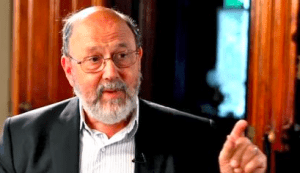 Maybe N.T Wright’s best title yet is Surprised by Hope, that word “surprise” giving Wright not a few opportunities to provide the shocking news of the gospel with that word “surprised.” So chp 3 in Simply Good News is called “Surprised by King Jesus.” Which is his way of setting up the reality of Jesus in his historical context as an over-against the Roman and Jewish powers that be (or were, and still are alive and well in our world).
Maybe N.T Wright’s best title yet is Surprised by Hope, that word “surprise” giving Wright not a few opportunities to provide the shocking news of the gospel with that word “surprised.” So chp 3 in Simply Good News is called “Surprised by King Jesus.” Which is his way of setting up the reality of Jesus in his historical context as an over-against the Roman and Jewish powers that be (or were, and still are alive and well in our world).
Wright has a robust christology and he does not back off the centrality of Jesus in all gospel talk. Gospel talk, then, is essentially a claim by Jesus about Jesus and anyone who talks gospel needs to state up front the centrality of Jesus. Hence,
People used to be bothered by the fact that Jesus talked about God but his followers talked later about Jesus himself—as though the early Christians were doing something Jesus never intended. That is nonsense. Yes, Jesus talked about God. Of course. But he did so precisely to explain what he himself was up to. “If I’m casting out demons because I’m in league with God’s spirit,” he said when challenged, “well, then, God’s kingdom has arrived on your doorstep!” (Matt. 12:28). He was claiming, in effect, to be the good news in person (36-37).
The focus of this chp is the surprising content and manner of the gospel that Jesus embodied and declared, rooted in Jesus’ very understanding of God himself. Jesus’ vision counters the options of his day. Thus,
All this goes to show that plenty of people wanted God to sort everything out and rescue his people, but nobody quite knew how it would happen (38).
Rather, he had a different vision of God, God’s purposes, and God’s way of achieving those purposes—a different vision of what the real good news was supposed to be…. If Jesus had given the word, plenty of folk would have hammered their farming tools into swords and signed up (38).
This is my favorite section in this chapter as it sketches what the options were:
The Jewish people of the first century were expecting their God to come back in person to rescue them, revealing his glorious presence, defeating their enemies, and reestablishing them as his people once and for all.
They got Jesus.
They were hoping for a new exodus—that is, a repeat performance of what had happened fifteen hundred years earlier, when the Israelites had been enslaved in Egypt and their God (they believed) came to rescue them. He had overcome the powerful Egyptian rulers, liberated his people, and led them in person through the Sinai Desert to bring them to the promised land. Many prophets had said that one day God would do something like this again. Many people were hoping it would be soon.
They got Jesus.
They were hoping for a new age of justice and peace. Ancient scriptures had spoken of a time when the wolf would lie down with the lamb, the mountains would drip sweet wine, and the earth would be full of the knowledge and the glory of the one true God like waters filling the sea.
They got Jesus.
Is it any wonder they were puzzled? (40-41)
The result? The kingdom of Jesus is a different kind of kingdom with a different kind of God at the helm.
This is central to the good news Jesus announced. It isn’t just that God is becoming king, through Jesus and what he is doing, but that God’s kingship is a different sort of kingship altogether (42).
Jesus’s power is of a totally different sort, as he explained to the Roman governor a few minutes before the governor sent him to his death—thereby proving the point. The kingdoms of the world run on violence. The kingdom of God, Jesus declared, runs on love.
That is the good news (44).
One cannot talk about the Jesus of the kingdom of God without talking about the paradox at the center: he was crucified and this crucifixion was part of God’s plan to redeem and forgive and restore all creation to himself. Wright uses terms that make many nervous today — yes, penal substitution. Wright is sometimes only categorized as a Christus Victor theorist but he has said more than once that he sees the atonement in terms of penal and substitution. Maybe not quite the way some propitiatory types want, but still…
We note, by the way, that though Paul very clearly sees Jesus’s death here as both penal (this was a judicial sentence) and substitutionary (Jesus dies, therefore we do not die), he does not say that God punished Jesus (45-46).
And that Jesus was raised from the dead and this resurrection establishes a new kind of moral vision as well, one rooted not in power or violence but in love:
So how might we in turn summarize the good news—both the good news announced by Jesus and the good news that his first followers announced when they talked about him later on? The good news is that the one true God has now taken charge of the world, in and through Jesus and his death and resurrection….The good news was, and is, that all this has happened in and through Jesus; that one day it will happen, completely and utterly, to all creation; and that we humans, every single one of us, whoever we are, can be caught up in that transformation here and now. This is the Christian gospel. Do not allow yourself to be fobbed off with anything less (55).
As this book unfolds I will be looking to see where N.T. Wright locates the church in this gospel message.










